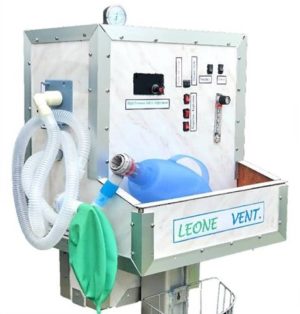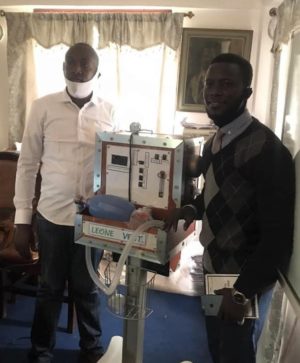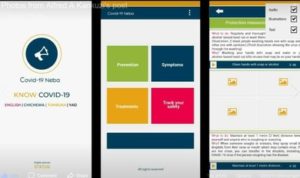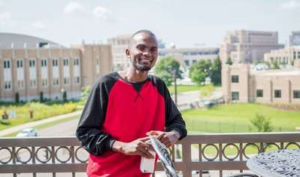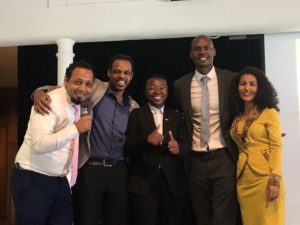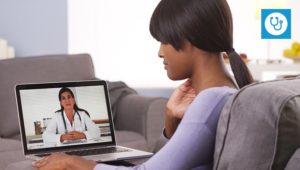Global Challenges, Local Solutions: Alumni Tackle COVID-19 Through Innovation
In the turbulent business environment brought on by the COVID-19 pandemic, entrepreneurs must be nimble, creative, and perseverant for their businesses to survive. But rather than just getting by, they can take advantage of needs and openings in the market by pivoting to create and supply new products and fill gaps caused by changes in their countries and economies.
Across Sub-Saharan Africa, Mandela Washington Fellowship Alumni are meeting the challenges of COVID-19 head-on. Here are the stories of how three of them have come up with home-grown, cost-effective technological solutions to the pandemic’s new challenges.
The lessons I learned from the [Fellowship] … further enhanced my civic responsibility and leadership traits. It was on these grounds that I realized how crucial it is to respond innovatively to the COVID-19 pandemic.”
Amara Tunkara, 2017 Fellowship Alumnus, Sierra Leone
Helping the Sickest Patients Survive
When Sierra Leone recorded its first COVID-19 case in April 2020, the country had only one ventilator for a population of 7.5 million people. Beyond this, the price of a new ventilator was thousands of dollars – cost-prohibitive in the best of times.
So, Amara Tunkara, 2017 Fellowship Alumnus, decided to sponsor seven students at the University of Sierra Leone to develop a new ventilator that would be wholly designed and built in-country. Beyond financial support, Amara provided them with mentorship, motivating and connecting them with key stakeholders and partners who were interested in the project.
Between April and June, Amara collaborated with the students to develop the prototype of their machine, called the Leone Vent. Designed to be hand-operated when needed and usable on a moving ambulance, the machine meets the specifications of other modern ventilators at a fraction of the cost.
“The lessons I learned from the [Fellowship] … further enhanced my civic responsibility and leadership traits,” says Amara, who attended a Leadership in Public Management Institute at the University of Maine. “It was on these grounds that I realized how crucial it is to respond innovatively to the COVID-19 pandemic.”
Amara hopes that the Leone Vent helps Sierra Leoneans come up with other innovative ways to create local solutions to solve national problems. While the machine is still in its pilot phase, the students and faculty at the University of Sierra Leone involved in the project are collaborating on other initiatives, which Amara hopes may address other crises in the country.
We need to feel, relate, think, and be in the shoes of our communities for the greater good, and not personal gain. This is what the University of Notre Dame and the [Fellowship] have taught me.”
Alfred Kankuzi, 2017 Fellowship Alumnus, Malawi
Creating a Virtual Neighborhood Information Hub
As an entrepreneur, Alfred Kankuzi, a 2017 Fellowship Alumnus from Malawi, has long striven to use technology in innovative ways to address community challenges. Currently, he is developing programs to help connect people in the informal sector to the economy and improve access to health information.
When COVID-19 hit, Alfred realized that most Malawians were gathering information via social media, which was causing increased confusion, fear, and panic. He decided to develop an app and website called COVID Neba (“Hey Neighbor” in the Chichewa language) where up-to-date information would be available in multiple languages, making information accessible to linguistically diverse communities.
Through COVID Neba, Alfred has helped to keep information on COVID-19 flowing through the most common way that Malawians access the internet – the smartphone. Once users download the app, they can access the information on it anytime, with or without a data connection. Any time they connect to the internet again, the app syncs and provides the users with updates. Currently, COVID Neba is available in five languages, but Alfred hopes it continues to grow and expand its reach throughout Malawi and beyond.
Since his Fellowship, Alfred has realized the power of servant leadership and the importance of collaborating with his community to address systemic issues and the ongoing crisis: “We need to feel, relate, think, and be in the shoes of our communities for the greater good, and not personal gain. This is what the University of Notre Dame and the [Fellowship] have taught me.”
Alfred continues to collaborate with other Fellows across the continent who are also social entrepreneurs, and he is helping to incubate other companies. After his Fellowship, during which he participated in a Leadership in Business Institute at the University of Notre Dame, he mentored 15 startups that have been successful in a variety of industries, and he looks forward to mentoring other like-minded folks who are trying to solve problems in their countries.
The Fellowship helped me learn about how life is more than just being financially successful – it’s also about helping everyone move forward. Some things have a huge impact on you and transcend financial success, like helping your community.”
Emmanuel Luthuli, 2017 Fellowship Alumnus, South Africa
The Doctor Will See You Now
During his Leadership in Business Institute at Dartmouth College, Emmanuel Luthuli, 2017 Fellowship Alumnus from South Africa, and his peers were tasked with creating innovative solutions to Africa’s problems. Emmanuel pitched an idea to address an issue close to his heart: promoting access to telemedicine for patients unable to travel or afford medical care in a hospital.
Thus, See A Doctor, an online, on-demand telehealth platform for low income and remote communities, was born. Patients can sign up to consult with doctors, psychologists, and dietitians free of charge through See A Doctor’s website and customized remote platform. Following their Leadership Institute, Emmanuel and several other Fellowship Alumni formed a working group to develop the platform, find doctors who could volunteer their time, and promote the service to improve access to healthcare. Additionally, several Fellowship Alumni who are doctors and medical professionals volunteer their time to serve patients through the platform.
When COVID-19 struck South Africa, See A Doctor’s online traffic ramped up dramatically due to the lack of information on the new disease and the demand for telemedicine following the nationwide lockdown. Beyond their typical online consultations, the platform’s volunteer physicians began providing general medical and safety advice, both related to preventing the spread of the disease and what to do if a patient was exposed to it.
Though the pandemic brought challenges, it was also a great opportunity for See A Doctor, says Emmanuel. “We launched the platform in 2019, but for a while, people didn’t know we existed. Now, we are partnering with local governments to improve access to information, and more low-income patients are getting the help they need.”
Emmanuel says that lessons from his time in the United States have had a huge influence on his approach to challenges and work. “The Fellowship helped me learn about how life is more than just being financially successful – it’s also about helping everyone move forward. Some things have a huge impact on you and transcend financial success, like helping your community.”
Fellowship Alumni and selected candidates for 2021 who are interested in learning more about this topic are encouraged to take the Identifying Market Needs and Gaps: Building Your Business During a Crisis course through the Fellowship Portal. Learn more about the course.
If you have not yet registered for the Portal, please contact the Fellowship Team at mwfellowship@irex.org.
Written by Meredith Lopez. Contributions by Kristen Shannon.
Next Story
Fellowship Alumni
University of Iowa
